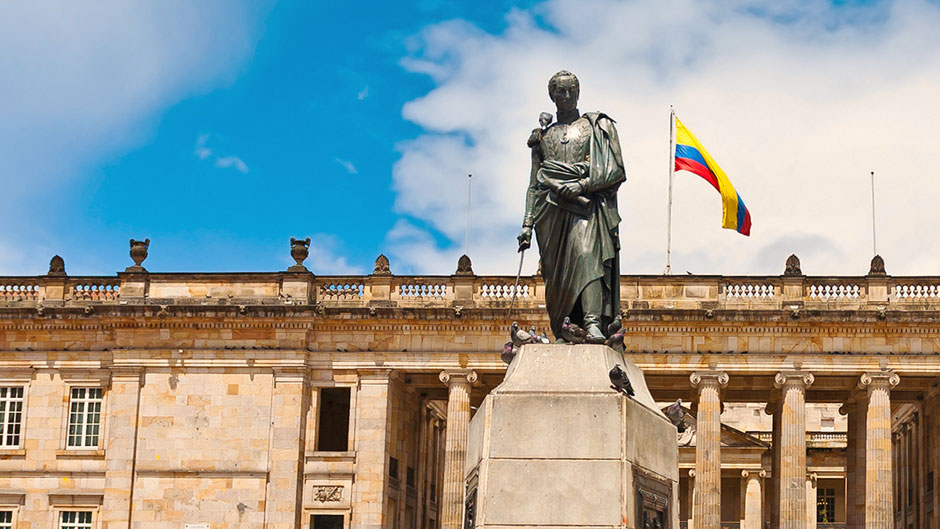On Sunday, May 27, 2018, Colombia is set to carry out the first round of its scheduled presidential elections.
These elections will be historic for two principal reasons: First, it constitutes the first presidential contest to take place in Colombia in the wake of the country’s November 2016 peace accord signed between the FARC (Colombian Revolutionary Armed Forces) Marxist guerrillas and the government of Colombian President and Nobel Peace Prize winner Juan Manuel Santos (2010-14; 2014-18) that formally ended 52 years of internal civil war; and secondly, after 16 years with President Alvaro Uribe (2002-2006; 2006-2010) or President Santos at the helm, Colombia is poised to elect a new generation of post-conflict political leaders who will take office on August 7, and strive to guide the country into a new era of peace and prosperity.
The elections have been hotly contested by a wide range of candidates since early 2018. If no single candidate wins the required majority of 50 percent plus one in the first round on May 27, a second round of voting between the two top finishers will be held on June 17, to determine who will be inaugurated as Colombia’s next president on August 7.
With an estimated turnout of between 15 million and 16 million voters expected (less than half of the eligible voting population of about 34 million), a first-round winner would need approximately 7.5 million to 8 million votes. At this late date, as a result of major intra-party schisms on both the right and left of the political spectrum and the highly fragmented outcomes of the March 11 congressional elections, no major candidate has been able to forge political alliances sufficient to allow him to win outright in the first round. So, barring a major surprise, a second round is very likely.
Colombia’s preelection voting surveys and polls are notoriously unreliable, in large part because they are usually sponsored and financed by one or anotherpolitical candidate or party and, hence, biased or skewed.
Nonetheless, by stringing together multiple surveys from different sources since January 2018, the available evidence as of May 17 strongly indicates that the right-wing candidate, Ivan Duque, has consistently kept a substantial lead over his main rivals ahead of the rapidly approaching May 27 election date, with 35 percent of voters saying they planned to back him. Support for Duque, a protégé of former right-wing President Uribe, fell three points from the last YanHaas survey in April.
Leftist candidate Gustavo Petro, a former member of Colombia’s M-19 guerrilla rebel movement and ex-mayor of Bogota, was in second place with 26 percent, down two points from the last survey by YanHaas. Centrist Sergio Fajardo was third with 14 percent and support for center-right German Vargas Lleras was 6 percent. Several other candidates, including liberal Humberto de la Calle, ranked even lower in the polls and appeared to have no realistic chance on May 27. The FARC presidential standard bearer received less than 1 percent support in the opinion polls and dropped out of the race after the March congressional election, revealing the depths of FARC’s unpopularity in the country.
All signs point to a likely runoff between right-wing candidate Duque and left-wing candidate Petro. The ideological and programmatic differences between the two candidates are stark. Duque is pro-U.S., likely to undermine or dismantle the Santos peace accords, and unconcerned with human rights or addressing the problems of Colombia’s rural and urban poor or the severe wealth, income and land inequalities that characterize Colombia. Petro favors the peace accord and has proposed major socialist- style reforms for the country if he wins.
The presidential campaign debates have not been lofty or edifying. In fact, the entire campaign has been characterized by dirty politics, false accusations, “fake news” and venality on both sides. The Colombian right has conducted a systematic (and largely false) smear campaign against Petro and the Colombian left, linking them with the FARC and accusing them of favoring ruinous Castro-Chavista style authoritarian socialism and Maduro’s Venezuela, while Petro has consistently denounced Duque as a corrupt, Uribista-style puppet of the Colombian ruling class who favors repressive and antidemocratic policies against the rural and urban poor, and who will dismantle the peace accords with the FARC—dragging Colombia back into permanent war with rebel forces.
None of the candidates have seriously addressed Colombia’s most important and pressing socio-economic and political problems, such as rising drug-related violence, organized crime, poverty, lack of infrastructure, rampant judicial and political corruption, possible negotiations with the ELN guerrillas, effective implementation of the faltering peace accords, or how to deal with an increasingly hostile Trump administration in Washington, among many other key issues.
Duque is far and away the most likely victor in a second-round runoff. What is unclear is how he will seek to govern the country after August 7 or if he will have sufficient congressional support to implement any of his administration’s policy priorities. Unfortunately, at this moment the most likely scenario is that Colombia under Duque will face an unraveling of the historic Santos-FARC peace accords, rising levels of internal violence and conflict, and serious problems of effective governance and corruption.
Bruce Bagley is a professor of political science at the University of Miami and an expert on U.S.-Latin American relations.

